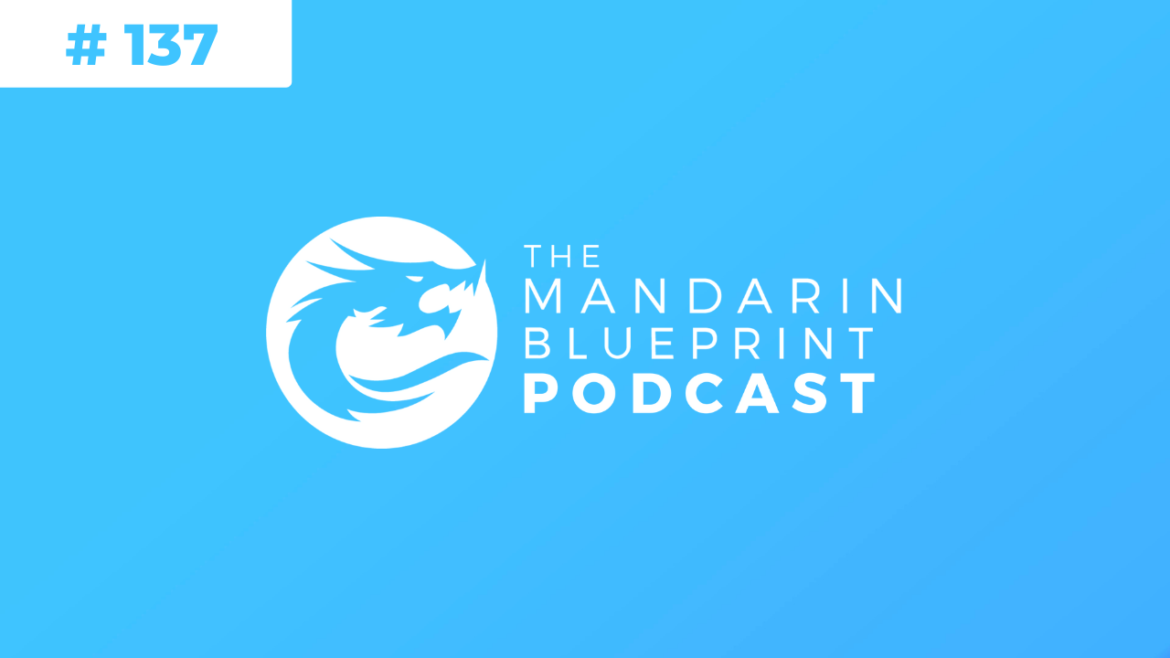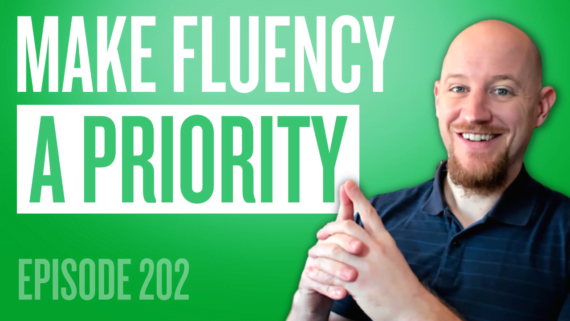
137. Starting Over With Mandarin Chinese
欢迎光临! Welcome!
You can now subscribe to the podcast by the links below, or you can subscribe by copying the following URL into your favorite podcast APP.
The Mandarin Blueprint Podcast focuses primarily on The Blueprint online curriculum. Creators Luke Neale & Phil Crimmins answer questions and comments, discuss topics related to China and Mandarin learning, and have special guests.
Want to learn how to speak fluent Chinese fast? Join our free Webinar right here.
欢迎光临! Welcome!
You can now subscribe to the podcast on iTunes, Stitcher, Spotify, or you can subscribe by copying the following URL into your favorite podcast APP:
https://www.mandarinblueprint.com/feed/podcast/
The Mandarin Blueprint Podcast focuses primarily on The Mandarin Blueprint Method online curriculum. Creators Luke Neale & Phil Crimmins answer questions and comments, discuss topics related to China and Mandarin learning, and have special guests.
0:00 Affiliate Link & Reviews
Become a Mandarin Blueprint Affiliate
Leave us a Google Business Review 🙂
19:28 Comments & Emails
Raiyan Syed by Community
Hi! I have a lot of thoughts so apologies in advance for the length. I’ll try to put some subheadings to make it easier.
-self intro-
I’m 24, and I live in the US but was born in Bangladesh. I grew up speaking Bengali and English. In middle school, I began to study Spanish and eventually finished a minor in it in college. In high school, I began to study classical Arabic and can read, write, and understand it somewhat well. I know Luke and Phil like to say learning languages has nothing to do with talent, but language, and specifically grammar, is something I have always excelled at. Therefore, I didn’t hesitate to dive into Mandarin.I actually got inspired to start learning Mandarin by watching polyglot YouTubers interact with people on the street in Mandarin. I’ve spent enough time studying other languages to know how great it feels when you can connect with someone in their language or can connect to another culture through language. With Mandarin being one of the most spoken languages in the world, I knew that if I could learn it, there are so many more people in the world that I could interact with in a more meaningful manner. The other languages I speak/study are all in the top ten most spoken in the world, and Mandarin would be a great addition.
It also seems like with the current world order, knowing Mandarin will only become more useful overtime.
When I started looking for a good course, a website I found recommended Mandarin Blueprint and Yoyo Chinese. I was really impressed by the marketing of MB and then another friend recommended it so I began the program after that.
-thoughts on the course so far related to tones/pronunciation-
I had a few reflections to share after going through pronunciation mastery and 59 characters into the main course on lvl 8.1. The variety of recorded voices available is interesting. I find that Anny says the tones very clearly and makes it easy to replicate. However, when I make my first tone like hers, I sound a bit unnatural and exaggerated to some of my Chinese friends. It makes sense though because I can match the pitch of her first tone, but it isn’t natural for me.
The easiest way for me to do things is to make my tone pitches more similar to the male speaker but imitating Anny’s tone technique. I also noticed that Anny has less tongue curl than Jerry (hope that’s spelled right) on sounds like “chi” “shi” and “zhi.” That is also easier for me to replicate.
I had an issue where I sounded too forceful on 4th tone and the slow pronunciations by Anny on all of the movie review Anki cards has gotten me to refocus on the high-to-low pitch technique of the fourth tone instead of just making a forceful sound.
I do a little of the tone pairs bonus Anki deck and that speaker says words faster and probably more in the flow of sentences than many words in the pronunciation mastery that are said on their own. This speaker has been helpful to learn from, but I can’t help but notice that her second tone sounds a bit subdued. Even when Anny reads entire sentences, I can clearly hear the low-to-high tone. I’ve been trying to follow Anny’s second tone technique, but I’m not sure what to make of how the tone pairs speaker says it.
-thoughts on my progress so far-
2. In all the other languages I’ve studied, I’ve learned how to read and write so I’m glad MB focuses on characters initially instead of speaking outside of pronunciation mastery. However, as I’m about 60 characters in, I do wonder when I’ll start to feel like I can do a bit more in terms of output. I know that I’m currently building a foundation to be able to output well later, but I’m wondering when I’ll feel like I will be able to reap the rewards of the work I’m doing now. Maybe it’ll be after the 105th character when sentences come more into focus? I’ll stick with it, but it’d be nice to know where the light is at the end of the tunnel I guess.
Thank you for reading! Any feedback or related discussion is greatly appreciated!
31:08
Jeremy Marie by Email
Greetings Luke and Phil!
As you have mentioned, I have been using the TMBM course for over a month. First, a little bit of background…
I’ve begun my journey learning Chinese in April of last year when I began watching YouTube videos. This was the result of growing disinterested in romance languages after having studied them casually for over 30 years without any success in achieving fluency. I was effectively hopeless.
This past year, I’ve tried many of the popular learning apps and have enjoyed them greatly, however I was on a quest to discover effective techniques that worked best for my learning, and nothing seems to have worked for me. In fact, they were enough to hold my interest to a certain extent, but it felt as though they added more complexity in learning and gave me a sense that reaching the finish line of fluency was never going to be achieved. Fast forward to the present…
I began to question my learning processes and I knew that I needed to employ mnemonic and memory techniques. I knew this based on my experience with the “Remembering Simplified Hanzi” book by James Heisig and Timothy Richardson. I’ve spent about a month on that book and was amazed at the results. I had proven to myself at that point that I had found the learning technique that works for me and decided to go all-in.
The RSH book has proven to be helpful to a degree, but it wasn’t enough for me to stick with it. To me, it was the equivalent of being handed tools and being told to build a house. It was overwhelming. Now, I knew that I needed something similar, but with a structured approach. Using my analogy, I needed something to give me a choice of foundations and home designs in order to be comfortable enough to build my house. Enter TMBM…
In my search for memory techniques such as memory palaces, I came across your videos and observed that your product had the name “blueprint” in it. This sounded exactly like the type of structured learning I needed. I started the 14 day trial (this has since been increased to 30 days) and was hooked.
At this time, I’m on phase 3 character 115 and feel that I have made the correct choice in investing in this product. I’m absolutely convinced that this program will bring me to fluency in a language for the first time in over 30 years of studying languages.
I have purchased the first three courses individually due to budgetary concerns, but my aim is to eventually purchase the course in it’s entirety one day. I am THAT convinced of it’s effectiveness ?.
Thank you gentlemen for your hard work and dedication to teaching this wonderful language and I wish you all the best!
35:31
Mesrop Porsem on Vocab Unlocked from 为: 为了 – 认为 – 为什么
I’ve noticed that in the word connections wei is sometimes second, sometimes fourth tone. is there any explication on that?
39:01
Lynn Ford on The “Living Links Logic” of Chinese Word Learning – Part 3
For 便宜 I immediately thought of Ramen, because it is convenient, you can buy it anywhere, its an appropriate for a cheap meal. You can also buy it at convenience stores. Is that the sort of logic for living links? I am doing well on the characters, scenes, props, etc, but still figuring out the living links for vocab.
If I don’t use a mnemonic off of the sound of the word and use an image only, that should still work, right?
42:45
Matt Shubert on Level 15 Complete
On the topic of sentences, one thing that I’ve started doing to make better use of them in my study sessions is immediately play the answer, without looking at the characters, and see if I can get the meaning just by listening to the audio. If I get it within one play of the male and female voices, that’s an “Easy”.
If I have to play it again or look at the characters, that’s a “Good”, or if I have to really go one by one through each character to figure out the meaning then that’s a “Hard”. I think it’s helping with my listening skills and it makes the sentence study (which can get a bit tedious as I like to unsuspend a lot of them!) a lot more fun.
45:04
Matt Shubert on Level 16 Complete
[sorry for the long comment, just feeling very motivated right now and had to get this out]
Confession time: I’ve been here before. I did the MBM course up to this exact set of characters and stopped, about a year ago (back before the restructuring of vocab/HMM lessons and decks). I got overwhelmed with life stuff and totally dropped my learning and my flashcard reviews as they just seemed like too much work. They piled up, and it became a feedback loop – “ah, too many cards, no way I can do my lessons, which makes the cards pointless” etc. etc.
But I’ve since come back and re-did the course from lesson 1. I actually deleted all my old cards and started totally fresh (love the new organization of cards and lessons, BTW) and have now gotten into a rhythm of 1-1.5 hours of study as soon as I wake up every day, 7 days a week – I don’t let work or weekend laziness or anything else get in my way. I’ve gotten back to where I was before with ten times more confidence, a renewed motivation, and a positive study habit. I’m f*ing ready to break through this self-constructed barrier between beginner and intermediate Chinese learner, in large part due to Luke & Phil’s continuous work to make this course as good as it can be.
To anyone else who is reaching this point and starting to feel overwhelmed with how much they need to review or who is feeling like they’re burning out – be kind to yourself, recognize that this is a long journey and not a race, and if you have to retread some ground, know that it may actually help you in the long run.
Cheers MBM gang, see ya in the next lesson!
50:59
Soren Korsbaek on Vocab Unlocked from 耐
不要那么不耐烦, 我们又没有把所有过错归到你身上
what does this mean?
55:28
Evan Hall on Make a Movie 饿
this takes me back all the way to the pronunciation master course, those cards with è are seared in my brain thanks to anki. I’ve come so far! I never thought I would have learned this much.
56:44
Kairi Shikari on Vocab Unlocked from 健
I think for the sentence 他一周会去健身房健身两次, 每次半小时 , shouldn’t 健身房 be added as a new vocabulary word or a top down word in the sentence?
1:02:29
Soren Korsbaek on Vocab Unlocked from 装
你得学会去包装自己来吸引别人的注意力
what does this one mean?
1:04:52
Jason Pon on Level 29 Complete
What do the numbers mean next to each character in the Progress by Word Type chart? For example, 年2?
Also – a question I should’ve asked earlier, but how do I know how many vocab words I’ve learned up to this point that does not involve counting from the chart?
1:07:14
Jason Pon on 像 in Context
我长得像妈妈.
What’s the difference between 长得 and 像 in this sentence? I understand them both to mean the same thing.
1:09:09
Philip Dong on 长相 in Context
Hi Luke & Phil. in the sentence, 他的长相和他妈妈一样, would it be incorrect to write / say it as: 他的长相和他的妈妈一样 instead?
Thanks!
Philip
1:11:00
Jason Pon on 卖 in Context
每一个公司都应该诚实,然后用心把自己卖的东西做好
What does the 用心 mean here? Is it just like ‘use their (honest) heart’ or something? It this a colloquial thing?
Also – 自己卖的东西 – all this to say ‘product’? Is there just a single word for this? Or is this a more specific meaning on context?
1:13:37
Jason Pon on 件 in Context
她今天会穿一件红衣服
Would the meaning be different if it was 她今天会穿红衣服 without the measure word: “She is going to wear red (clothes) today”?
1:14:53
Jason Pon on 广告 in Context
比如,广告里的牛肉面,牛肉特别大一块
Is the 里面 being split up with 的牛肉, to talking the beef inside the ad (I feel it isn’t), or does 牛肉面 instead mean ‘beef cubes’? If so, not sure how 面 represents this. Are beef cubes called 面?
1:16:44
Jason Pon on 当时 in Context
Is is a past-oriented word? Or can it also be used in future context. like ‘I will at the time do xyz’. I asked because the sentence doesn’t have anything else to indicate ‘should have’ in the past.
1:17:43 Movies!
This blog post explains the theory behind Movie Scenes and learning characters.
Ric Santos on Make a Movie 造
造 : “Walk the talk”.
Even though this is not a Hanzi movie, “walk the talk” comes to my mind from (辶) and (告).
This reminds me of the chapter of creation in the bible where God, along the way (辶) , says the word ( 告= informs) and then something is created . (创造-chuàng zào ).
1:18:36
Will Raley on Make a Movie 棵
棵 kē Flora (all the plants of a particular area or period of time)
1. Keanu Reeves at -e’s Front door
2. All the Flora around the door is dull and dying due to a Tree (木) taking up all the root soul space
3. Keanu fires a Pineapple (果) at the Tree and knocks it over
4. All the Flora (棵) around the door begins to brighten up
5. Today is a great ‘period of time’ for the Flora thanks to Keanu
1:19:34
Hank Elliott on Make a Movie 兆
My son-in-law Jeremy (Zh-actor) is in the backyard (tone) of Sandisfield Ambulance (ao-set) with his children, both with their SKATES (prop) on their LEGS (prop). They are both skating so so well. Its a great OMEN (keyword) for their athletic future which pleases Jeremy. Faster and faster they skate. Their skill and future health are assured. What a great OMEN!
1:21:25
Hank Elliott on Make a Movie 挑
Una Thurman(Ti-actor) is the enforcer for an evil scam ring (from a TV show), She is outfront (tone) of Sandisfield Ambulance (ao-set). She is desperately searching for the next evil scammer to work for The Doctor (from a show). She suddenly spots evil looking DAMIEN (prop) and points at him with her giant Finger (prop). she knows he will do perfectly with that horribly evil looking face. She PICKS (keyword) him from the crowd of wanna be evil doers. Immediately she begins scamming Damien into believing she is the good guy. Ah, he will find out sooner or later that he is perfect for the role of scammer and will be glad he was PICKed!
1:22:59
Nick Sims (戴燚)on Make a Movie 客
Kevin Hart (k-) is in the bathroom at Barton (-e) but the room feels and looks like Wakanda. He puts a tin can (宀) on his head as his crown and holds his passport (各). You may enter Wakanda as our GUEST.
1:23:38
Nick Sims (戴燚)on Make a Movie 备
Bruce Lee (b-) is in the bathroom at Grandma Davis’ (-ei) teaching a sloth ? (夂) how to PREPARE his mind for battle. Take this Rubik’s cube (田) and GET READY for a mental battle. Go! Bruce thinks, I better BE READY for a long night.
1:24:38
Nick Sims (戴燚)on Make a Movie 令
Lisa (li-) is in the bathroom at the Engineering Bldg (-ng) when her Apple Calendar ? app (今) goes off. Siri speaks and ORDERS her to MAKE SOMETHING HAPPEN today because she’s bored! Lisa adds a drop (丶) of glue to the app so it never speaks again.


